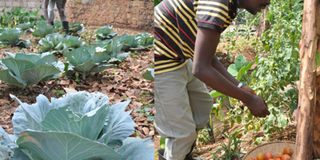2019/20 budget: Govt commits funds to industrialise agriculture

Climate change is the biggest threat farmers are facing. To produce more, farmers must embrace remedies such as irrigation. Photo by Rachel Mabala
Some Shs840b will be directly invested into the agricultural sector, and another Shs218b indirectly through interdependent sectors, according to the 2019/20 budget framework.
Wilson Twamuhabwa, an economic advisor with the Ministry of Finance, Economic Planning & Development, says in the 2019/20 budget, Shs61.4b has been allocated for agriculture infrastructure, mechanisation and water for agricultural production, Shs103b funding to the Uganda Development Bank for sector activities and Shs54.72b to the Microfinance Support Centre to be utilised by farmers’ Saccos.
Zoning
The economic advisor says government is committed to industrialisation of the agricultural sector in the country by defying seasons and weather challenges by introducing irrigation schemes as well as prioritising regional crop advantages. The turnaround upshot is expected to be achieved through the national zoning strategy.
Teso Sub-region has benefitted from efforts with the establishment of a fruit farm, in northern Uganda Atiak Sugar Factory has been set up, there is a rice factory in Nwoya, plans for a rice factory in Bulambuli District, and Amos Dairies in western Uganda, among others.
“This is the approach we are looking at in terms of zoning. We are already looking at establishing an industrial park in Mbale District,” Twamuhabwa explains.
Critical role
According to the World Bank, Uganda’s agriculture sector plays a critical role in the economy. It accounts for 70 per cent of the country’s employment, provides more than half of all exports, and is about one-quarter of Gross Domestic Product (GDP).
The global bank has defined agriculture as a key economic sector in Uganda’s transition into a middle-income country and, in this regard, has emphasised the importance of value addition, commercialisation, and building resilience to climate change. “Food processing industry has an important role to play in furthering the agriculture economy. The taxes and duties on agricultural produce and equipment need to be rationalised, thereby encouraging farmers to produce and at the same time maintaining an affordable price point for consumers,” Farid Karama, executive director of Africa Agribusiness Academy, explains.
Value addition
James Okwi, a mechanical engineer, found his passion in farming. He runs Kweyo Growers Cooperative Society, in northern Uganda, which was initially formed as a cotton growing cooperative, in 1973.
Tying in with government’s efforts towards uplifting farmers’ livelihoods through value addition avenues, Kweyo started adding value to groundnuts. When they are collected from farmers, with support from extension workers, groundnuts are stored and a quality controller engaged before it is processed into peanut butter with help from Uganda Industrial Research Institute (UIRI), a government support centre towards promising entrepreneurs.
Farmers such as Okwi are only a handful, owing to the rudimentary nature of the sector.
As Karama observes, there is still a challenge of convincing farmers to adopt to new age agriculture.
Technology in farming
Zilla Mary Arach, chief technology officer at Akorion, an agricultural innovation company that uses technology to provide services and products to farmers and agriculture-related entities in Uganda, says that technology intervention for empowering the different value chains can be a turnaround in agricultural sector.
Karama weighs in, observing that digitisation can help improve procurement, streamline payments, converge producers with consumers and accelerate adoption and dissemination of new farm technologies.
“Improving the fundamental strength to the sector through interventions in irrigation, insurance and farm credit can have a systemic long term impact on output of the sector,” he argues.
Agriculture insurance
Zilla roots for government to focus on agricultural loans to enable farmers access improved technologies.
“With the ever changing weather and climate, farmers are more vulnerable, so making crop insurance a priority since farming is a major source of income,” the agricultural innovator argues.
Impact of OWC
To Okwi, there has been very little good from Operation Wealth Creation (OWC) for many farmers.
“In our sub-county for example, OWC gave seeds and seedlings without educating farmers and the constant monitoring or gathering of feedback from these recipients. Another example is the maize mills that have been built without feasibility studies,” he adds.
Okwi would like to see more work done, even if it is just the groundwork for the future, looking at what OWC can do to support farmers and farmer groups in regards to value addition.
In giving priorities to Ugandan produce and products through initiatives such as Buy Uganda Build Uganda (BUBU), Okwi also calls on Uganda National Bureau of Standards (UNBS) to give them a fair chance by encouraging supermarkets and other outlets around the country to stock more locally made and certified products, giving them more preferential spaces on their shelves.
Trials
Zilla Mary Arach, chief technical officer at Akorion, observes that the agricultural sector is challenged by different issues such as high cost of inputs, dependency on rainfall, low mechanisation, unorganised market structure, inadequate infrastructure and availability of credit.
James Okwi finds fault with policy, arguing that it affects agricultural growth. “I hope that the agenda that will be set for this year’s budget will actually start looking at how farmers can be helped in certain areas, and encouraging the mobilisation of these farmers into groups,” says Okwi.




